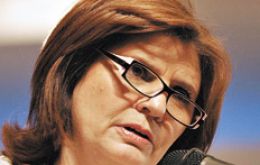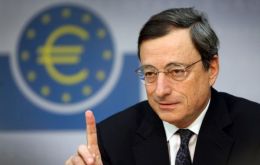MercoPress. South Atlantic News Agency
Economy
-
Friday, January 13th 2012 - 21:48 UTC
UK producer prices drop in December; further emergency stimulus anticipated

The prices of goods leaving Britain's factories surprisingly fell in December compared with November, confirming expectations that inflation is set to ease further this year, official data showed Friday.
-
Friday, January 13th 2012 - 21:18 UTC
S&P downgrades France’s rating; Greek swap talks on hold; Euro hits new low

Stock markets and the Euro traded lower Friday as Greek debt swap talks were put on hold and France’s Finance minister confirmed that Standard & Poor’s has downgraded the country’s credit rating.
-
Friday, January 13th 2012 - 21:13 UTC
Several groups interested in taking over bankrupt American Airlines

US Airways Group, Delta Airlines and private equity firm TPG Capital are among several parties interested in potential bids for AMR Corp, the bankrupt parent of American Airlines according to US financial media reports.
-
Friday, January 13th 2012 - 20:15 UTC
Non-official Argentine inflation hits 1.9% in December and 22.81% in 2011

Argentine opposition lawmakers presented December’s consumer inflation index based in the analysis of nine private agencies, which showed a 1.9% increase over the previous month and totalling 22.81% for the twelve months of 2011, roughly double the official index.
-
Friday, January 13th 2012 - 19:51 UTC
Obama asks Congress for a 1.2 trillion dollars increase in US debt limit

US President Barack Obama formally notified Congress that he plans a 1.2 trillion dollars increase in the US debt limit, setting the stage for Republicans to level election-year charges that deficits are out of control.
-
Friday, January 13th 2012 - 14:48 UTC
Falklands plans to export 30.000 lambs this season from upgraded abattoir

The Falkland Islands Meat Company (FIMCo) may export up to 30,000 lambs in the coming season compared to 26,000 last year in an abattoir successfully upgraded by local companies, reports the Penguin News in this week’s edition.
-
Thursday, January 12th 2012 - 21:52 UTC
FAO Food prices index in spite of mild drop, reached highest average in 2011

Food prices fell in December 2011 with the FAO Food Price Index dropping 2.4%, or five points from November, FAO said on Thursday. At its new level of 211 points, the Index was 11.3% (27 points) below its peak in February 2011.
-
Thursday, January 12th 2012 - 21:31 UTC
Argentina and IMF moving closer, admit holding regular bilateral contact

Speaking at a press conference from Washington DC on Thursday, IMF acting director of External Relations Gerry Rice said the organization’s directors “will meet in late January or early February to analyze the progress made in Argentina’s statistics”.
-
Thursday, January 12th 2012 - 21:28 UTC
ECB says flood of ‘cheap money’ helping the Euro zone banking system

The European Central Bank's flood of cheap three-year money is helping the Euro zone's banking system substantially and supporting confidence in the bloc's economy which is showing some signs of stabilisation, president Mario Dragui said on Thursday.
-
Thursday, January 12th 2012 - 21:21 UTC
Argentine industry ‘under risk with new ‘super-license’ imports’ system

While Argentina’s Mercosur trade partners have adopted a cautious attitude regarding the latest measures that make it more cumbersome and bureaucratic to sell to Argentina, the country’s manufacturers and importers have warned of the consequences and called for a more balanced approach to the issue.
